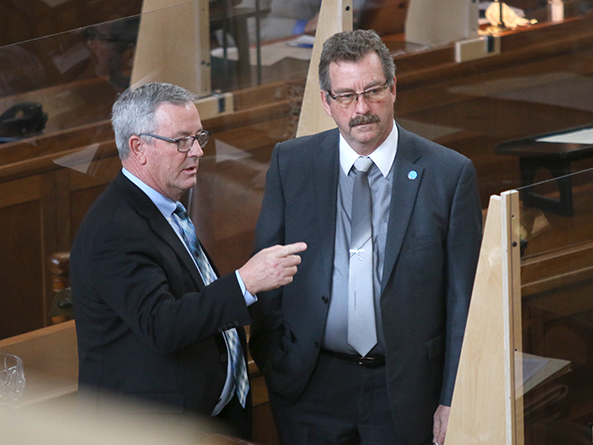Ban on treated seed in ethanol production amended, advanced
Lawmakers gave first-round approval March 25 to a bill that would prohibit the use of treated seed in ethanol production under certain circumstances.
LB507, as introduced by Brainard Sen. Bruce Bostelman, would prohibit the use of treated seed corn in the production of ethanol if its use results in the generation of a byproduct that is deemed unsafe for livestock consumption or land application.
Bostelman said he introduced the bill after being notified of an ethanol plant near Mead that had been using treated seed corn. He said the byproduct, also called distiller’s grain, is stockpiled on the company’s property and cannot be fed to livestock or applied to farmland because it contains pesticide residue.
“Using treated seed corn to produce ethanol is not environmentally safe, nor is it commonly used for production in Nebraska or anywhere else,” Bostelman said.
Omaha Sen. John Cavanaugh introduced an amendment, adopted 41-0, that he said would more clearly define “treated” and expand the prohibition to all treated seed.
A Natural Resources Committee amendment, adopted 42-0, replaced the bill. It contains the provisions of LB507, as amended by Cavanaugh’s proposal, and three other bills considered by the committee this session.
The amended provisions of LB190, introduced by Venango Sen. Dan Hughes, would prohibit the Legislature from appropriating or transferring money from the Water Sustainability Fund for purposes other than those outlined in statute after June 30, 2021.
Hughes said the change would ensure that the Legislature could not transfer money from the fund to help meet a budget shortfall.
The provisions of LB191, also introduced by Hughes, would allow a qualified landowner or leaseholder to be an irrigation district elector if they live in a certain irrigation district in which at least half of the landowners, leaseholders or entrymen of government lands are not Nebraska residents.
Hughes said the proposal is intended to prevent the dissolution of an irrigation district in southwest Nebraska.
Under the amended provisions of LB395, introduced by Creighton Sen. Tim Gragert, the secretary of the state Game and Parks Commission could designate special antelope and elk depredation seasons or extend existing hunting seasons when they determine that the animals are causing excessive property damage.
A Nebraska resident would pay no more than $25 for a special depredation season permit, and a nonresident would pay no more than $75.
The bill would require the commission to charge landowners and their immediate family members no more than $10 for a special depredation season permit. Those who own or operate at least 20 acres of farm or ranch land within the geographic area in which hunting would be permitted could take deer and antelope, and those who own or operate at least 80 acres could take elk.
The proposal also would require the commission to issue one free-earned elk permit to certain landowners and lessees when hunters have harvested the qualifying number of antlerless elk on their land.
The commission would use income from the special permits to abate damage caused by deer, antelope and elk.
Gragert said the proposal also would increase the number of landowner antelope and elk permits in each management unit from 50 percent to 75 percent of the regular permits authorized for the unit.
“[The amendment] gives Game and Parks more flexibility to do their job, allowing them to work more quickly with landowners and hunters to control crop damage,” he said.
After adopting a technical amendment, senators voted 43-0 to advance LB507 to the second round of debate.


